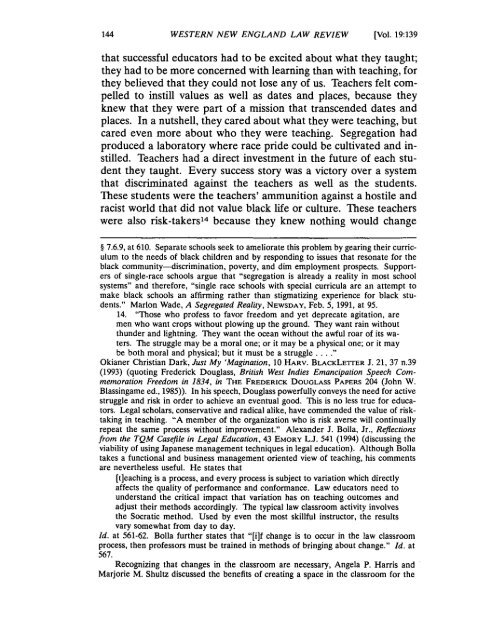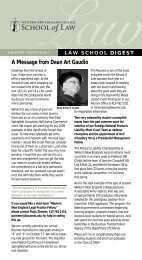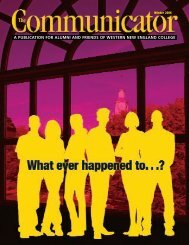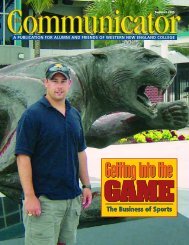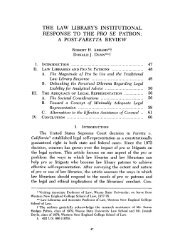legal education and the twenty-first century - Western New England ...
legal education and the twenty-first century - Western New England ...
legal education and the twenty-first century - Western New England ...
Create successful ePaper yourself
Turn your PDF publications into a flip-book with our unique Google optimized e-Paper software.
144 WESTERN NEW ENGLAND LAW REVIEW [Vol. 19:139<br />
that successful educators had to be excited about what <strong>the</strong>y taught;<br />
<strong>the</strong>y had to be more concerned with learning than with teaching, for<br />
<strong>the</strong>y believed that <strong>the</strong>y could not lose any of us. Teachers felt compelled<br />
to instill values as well as dates <strong>and</strong> places, because <strong>the</strong>y<br />
knew that <strong>the</strong>y were part of a mission that transcended dates <strong>and</strong><br />
places. In a nutshell, <strong>the</strong>y cared about what <strong>the</strong>y were teaching, but<br />
cared even more about who <strong>the</strong>y were teaching. Segregation had<br />
produced a laboratory where race pride could be cultivated <strong>and</strong> instilled.<br />
Teachers had a direct investment in <strong>the</strong> future of each student<br />
<strong>the</strong>y taught. Every success story was a victory over a system<br />
that discriminated against <strong>the</strong> teachers as well as <strong>the</strong> students.<br />
These students were <strong>the</strong> teachers' ammunition against a hostile <strong>and</strong><br />
racist world that did not value black life or culture. These teachers<br />
were also risk-takers 14 because <strong>the</strong>y knew nothing would change<br />
§ 7.6.9, at 610. Separate schools seek to ameliorate this problem by gearing <strong>the</strong>ir curriculum<br />
to <strong>the</strong> needs of black children <strong>and</strong> by responding to issues that resonate for <strong>the</strong><br />
black community-discrimination, poverty, <strong>and</strong> dim employment prospects. Supporters<br />
of single-race schools argue that "segregation is already a reality in most school<br />
systems" <strong>and</strong> <strong>the</strong>refore, "single race schools with special curricula are an attempt to<br />
make black schools an affirming ra<strong>the</strong>r than stigmatizing experience for black students."<br />
Marlon Wade, A Segregated Reality, NEWSDAY, Feb. 5, 1991, at 95.<br />
14. "Those who profess to favor freedom <strong>and</strong> yet deprecate agitation, are<br />
men who want crops without plowing up <strong>the</strong> ground. They want rain without<br />
thunder <strong>and</strong> lightning. They want <strong>the</strong> ocean without <strong>the</strong> awful roar of its waters.<br />
The struggle may be a moral one; or it may be a physical one; or it may<br />
be both moral <strong>and</strong> physical; but it must be a struggle ...."<br />
Okianer Christian Dark, Just My 'Magination, 10 HARV. BLACKLETIER J. 21, 37 n.39<br />
(1993) (quoting Frederick Douglass, British West Indies Emancipation Speech Commemoration<br />
Freedom in 1834, in THE FREDERICK DOUGLASS PAPERS 204 (John W.<br />
Blassingame ed., 1985)). In his speech, Douglass powerfully conveys <strong>the</strong> need for active<br />
struggle <strong>and</strong> risk in order to achieve an eventual good. This is no less true for educators.<br />
Legal scholars, conservative <strong>and</strong> radical alike, have commended <strong>the</strong> value of risktaking<br />
in teaching. "A member of <strong>the</strong> organization who is risk averse will continually<br />
repeat <strong>the</strong> same process without improvement." Alex<strong>and</strong>er J. Bolla, Jr., Reflections<br />
from <strong>the</strong> TQM CasefUe in Legal Education, 43 EMORY L.J. 541 (1994) (discussing <strong>the</strong><br />
viability of using Japanese management techniques in <strong>legal</strong> <strong>education</strong>). Although Bolla<br />
takes a functional <strong>and</strong> business management oriented view of teaching, his comments<br />
are never<strong>the</strong>less useful. He states that<br />
[t]eaching is a process, <strong>and</strong> every process is subject to variation which directly<br />
affects <strong>the</strong> quality of performance <strong>and</strong> conformance. Law educators need to<br />
underst<strong>and</strong> <strong>the</strong> critical impact that variation has on teaching outcomes <strong>and</strong><br />
adjust <strong>the</strong>ir methods accordingly. The typical law classroom activity involves<br />
<strong>the</strong> Socratic method. Used by even <strong>the</strong> most skillful instructor, <strong>the</strong> results<br />
vary somewhat from day to day.<br />
Id. at 561-62. Bolla fur<strong>the</strong>r states that "[i]f change is to occur in <strong>the</strong> law classroom<br />
process, <strong>the</strong>n professors must be trained in methods of bringing about change." Id. at<br />
567.<br />
Recognizing that changes in <strong>the</strong> classroom are necessary, Angela P. Harris <strong>and</strong><br />
Marjorie M. Shultz discussed <strong>the</strong> benefits of creating a space in <strong>the</strong> classroom for <strong>the</strong>


